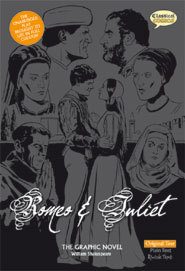This post was originally published in Nick Glass’ monthly column for Curriculum Connections, an e-newsletter published by School Library Journal in partnership with TeachingBooks.net. Subscribe to this free newsletter here.
Graphic fiction and nonfiction books are increasingly being used in schools to hook reluctant readers or to present topics in a different format. The multimedia materials recommended in this month’s column provide you with instructional support to integrate these graphic books into your lesson plans.
Use Graphic Fiction and Nonfiction to:
Entertain New Readers …
Explore lesson plans, audio recordings, and more for the best-selling “Babymouse” series (Random) by Jennifer L. Holm and Matt Holm.
Introduce the Greek Gods …
Listen as George O’Connor talks about the creation of Zeus: King of the Gods (First Second, 2010), and shares images from the book in this short video or read an interview with the author/illustrator published earlier this year.
Explore an Author’s Purpose …
In this audio clip author Liam O’Donnell discusses his graphic adventure illustrated by Mike Deas, Media Meltdown (Orca, 2009), which incorporates a message about social networks and information delivery.
Integrate Comics into History Lessons …
Utilize these ready-to-use resources when reading Art Spiegelman’s Pulitzer Prize-winning Maus I (1986) and Maus II (1991, both Pantheon) in conjunction with on units on World War II or the Holocaust.
Watch this TeachingBooks.net original movie about the creation of The 9/11 Report: A Graphic Adaptation (Hill & Wang, 2006) with Ernie Colón, the veteran comic book artist who wrote and illustrated this adaptation with Sid Jacobson.
Introduce Comic Guides and Activities to William Shakespeare’s Plays …
Try these classroom activities along with the “Classical Comics” series devoted to the Bard’s plays includingRomeo and Juliet: Graphic Novel (Classical Comics, 2009), adapted by John McDonald.
Insights from award-winning publisher Françoise Mouly:

Watch a two-minute overview on using comics to support early literacy activities or read an interview with Mouly on “Comics in the Educational Sphere.”
 Posted by Nick Glass, Founder & Executive Director of TeachingBooks.net
Posted by Nick Glass, Founder & Executive Director of TeachingBooks.net







Leave a Reply